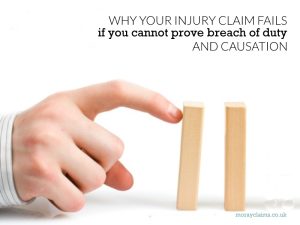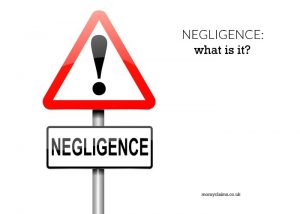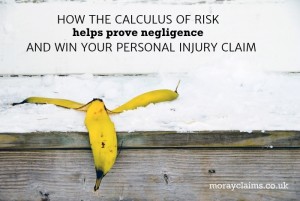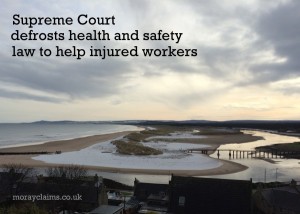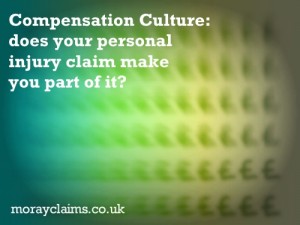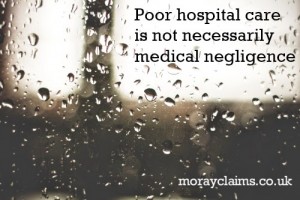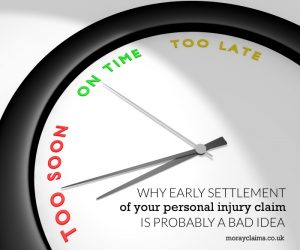When Andrew Kay was 2 years old, he contracted meningitis. It is a dangerous medical condition, causing inflammation of membranes in the central nervous system, and affecting the brain. On 28 November 1975, Andrew was admitted to Seafield Children’s Hospital in Ayr, seriously ill. As part of his treatment, he received an injection of penicillin. The problem was that, by mistake, he was given a massive overdose of penicillin – receiving about 30 (thirty) times the correct dose. In such a quantity, the penicillin was toxic and it caused Andrew to suffer convulsions. He later developed paralysis down one side of his body, though it was short-lived. Andrew recovered from his life-threatening illness, but he was left profoundly deaf. He also had significant learning difficulties. A claim for compensation From 1978, Andrew’s Dad, partly conducting the case himself, made a compensation claim on behalf of his son, raising an action in the Court of Session. Before the judge (in 1984), the Continue Reading
Negligence Articles
Negligence is an important concept in relation to personal injury claims in the UK in general and Scotland in particular. These articles, listed below, explain about how negligence is defined and how it is worked out in practice - so as to determine whether or not your personal injury claim will be successful.
Negligence: what is it?
Accidents which are no one's fault ... An accident is an event which could not reasonably have been foreseen by anyone and for which no one should be held responsible. If your injury is the result of such a mishap - a ‘pure’ accident - you will not be able to make a successful claim for compensation. ... Accidents which are someone's fault The modern idea of negligence dates from the 1930s. Negligence: what is it ? The basic definition of negligence that lawyers now use comes from the Scottish case of Donoghue –v- Stevenson. As a result of that case and other later cases, the law places defined limits on the classes of person who can claim and the types of injury for which they can claim. If you are going to be able to claim successfully, the person who injured you has to have been in such a position that they ought to have had you in mind when considering the possible impact of their actions in the circumstances. In practice, from the point of view of the person owing the duty of Continue Reading
How can you tell if someone has been negligent?
July 1999 was a momentous month for Scottish golf. The British Open returned to Carnoustie for the first time since 1975. More importantly, Paul Lawrie became the first Scottish winner since 1985 (and is still the most recent Scottish winner of a major). However, that championship will also be remembered for all the ‘wrong’ reasons French golfer, Jean van de Velde, snatched defeat from the jaws of victory, throwing away a 3-shot advantage on the final hole. At the 18th, a par 4, he could have taken 6 shots and still won - but he took 7, in fact holing a decent putt just to get himself into the playoff which he eventually lost. His play on the final hole is true ‘car crash’ television as he seemed to regress to beginner standard in dealing with the rough, a bunker and a water hazard. One author has classified van de Velde's problem as one of 'overthinking' In his book “The Art of Thinking Clearly”, Rolf Dobelli explains that skills involve an element of instinct and feeling. Continue Reading
Slip On Ice At Work Case Clarifies Law On Workplace Personal Injury Claims
Imagine you're employed as a home carer in Scotland. Your work requires you to go out at all times of day and in all kinds of weather to provide personal care to the elderly, vulnerable and terminally-ill. One night in winter, with snow and ice lying on the ground, you slip and fall as you make your way to one of your client's homes. You break your wrist. The flat boots you were wearing had ridged soles but their grip was not enough to keep you upright. It turns out that crampon-like shoe attachments were available at reasonable cost and they would probably have prevented your fall if your employer had given you them to use. In other words, you can argue that your employer failed to take proper care for your safety, by failing to provide adequate personal protective equipment, so you have a right to claim compensation from them for your injuries and other losses. On the other hand, periodic sub-zero temperatures are a fact of life in northern Europe, aren't they? Anyone Continue Reading
Compensation Culture: Does Your Personal Injury Claim Make You Part Of It?
Fear of furthering a perceived Compensation Culture is deterring people from making Personal Injury claims. We recently took on a claim for a man who had finally reached the decision, more than two years after his accident at work, to go ahead with a compensation claim for his injuries and other losses. Here’s what he told us: “I have a concern over the "bandwagon" of what might be considered modern-day "compensation culture" and how that might seem - on the face of it - to be getting exploited for less-than-deserving cases. And that was maybe a wee bit of my issue in relation to starting this process.” So is there a Compensation Culture and what do we mean by the term, anyway? A difficult thing to define In some contexts, the term “Compensation Culture” is shorthand for the desire of one person to sue a second person where the first person suffered due to something which could have been avoided if the second person (or organisation) had done things Continue Reading
Poor Hospital Care Is Not Necessarily Medical Negligence
It’s always a worry if you have to have hospital treatment. You’ll be concerned about the procedure or operation, any anaesthetic and the recovery period. The practicalities of your stay in hospital will also be on your mind, such as sharing a ward with others and the quality of the food. You’re unlikely to think about the risk of being injured due to medical negligence during your stay because health service staff are dedicated professionals working hard to deliver the best possible care. Their jobs require them to deal with deadlines and to keep within strict budgets. Sometimes, they have to exercise judgement in making decisions, weighing up competing risks. And medical science is not an exact science. Unfortunately. things don't always work out for the best. You need to understand that, if things go wrong and outcome of your treatment is not as you would wish, just because you have experienced poor standards of care, that does not necessarily mean you have Continue Reading
When your business insurers refuse to indemnify you
Businesses require to have Employers’ Liability insurance by law. This is so if an employee gets injured at work due to the employer’s breach of duty there is a guaranteed fund available to meet any claim. Public liability insurance covers organisations and businesses against negligence and breaches of duty which cause injury and loss to people other than their employees. This type of insurance is not compulsory by law but it is crucial to have in practice because even a single claim can be enough to bankrupt a business. Public liability claim against a small trade business We have come across a recent example of a public liability insurer refusing to cover a business for a claim against the business for fire damage to a house in Moray caused by probable negligence on the part of one of the employees of the business. This scenario gives rise to a valid claim against the business on the basis of vicarious liability. Alleged negligence leads to under-floor fire at domestic Continue Reading
Golf Ball Injuries: A Fair Way To Treat Golf Clubs?
In Scotland, there are more than 550 golf courses and Moray has 9 of them. I’m a (sadly, very inactive) member of Moray Golf Club (Lossiemouth), which has two fantastic links courses. An appeal decision of the Court of Session from March 2013 has health and safety implications for golfers and golf clubs all over Scotland. The Facts of the Case The case of Phee –v- Gordon concerned an inexperienced golfer (Mr Phee) who sued Niddry Castle Golf Club in West Lothian and a member of the golf club (Mr Gordon) as the result Mr Phee losing his left eye after being struck by a golf ball from a wayward tee shot hit by Mr Gordon. Arguments that Mr Phee was partly to blame for his injury were rejected by the court. However, the appeal was successful in that Mr Gordon convinced the court that the blame which had been apportioned as 30% to the golf club and 70% to Mr Gordon following the initial hearing of evidence should be reversed – and more - on appeal. In other words, though the Continue Reading
Accidents at Work: Now More Difficult to Win (But Still Winnable)
I have blogged previously about the proposed changes in the law relating to Employers’ Liability and it has now come to pass in the Enterprise and Regulatory Reform Act 2013. In broad terms, this is good news for employers and, especially, their insurers and bad news for employees. It was the law that breach of regulations under the Health and Safety at Work Act 1974 could give rise to civil liability. Goodbye to Strict Liability In some cases, this meant that there could be strict liability of employers – in other words, liability without needing to show any fault or lack of care on the part of the employer. The case that came to be the classic modern example of this involved a postman who was injured when the front forks of the bicycle he was riding – and which his employers provided to him - collapsed without warning. It was established that the cause of the equipment failure was a hidden defect. The employers had not been negligent. There was probably nothing they could Continue Reading
If You Are Injured By An Animal, Can You Make A Claim?
If an animal causes you an injury, can you make a claim for compensation? The modern law of negligence owes a lot to a mollusc but what if you have an accident in Scotland involving an animal – can you claim for your loss or damage? The Cow's Adventure One case from the 1950s involved a clever cow which managed to escape from premises in Inverness’s Eastgate, where it was due to be auctioned. It then managed to climb the stairway of a nearby property and fall through the floor into the shop below. In its struggles it turned on a tap, causing flooding. It also trampled and damaged stock. The Sheriff in that case decided there could be a successful claim against those responsible for the cattle at the time, if they could be shown to have been negligent. Dog Bites In our experience, the most likely injury scenario will involve a person being bitten by an animal, typically a dog. The law here is principally regulated by the Animals (Scotland) Act 1987. Liability Continue Reading
Vicarious Liability: How It Can Help A Work Accident Claim To Succeed
If you have been injured at work by the negligence of a fellow employee or in any situation by a person who was acting in the course of their employment, your claim can be based on what is known as vicarious liability. Often there will be other grounds of claim too but the most common use of negligence as a means of winning an employer’s liability case is vicarious liability. Vicarious liability is the legal doctrine that shifts the blame for an injury onto a person or organisation that did not directly cause the injury but which employed the person who did act negligently. The employer has to take responsibility for the negligence of the employee because the employee is deemed to be an agent of the employer. If an employee is to blame for causing an accident and was acting within the general scope of his or her employment at the time, the injured person will be able to claim against the employer. The theory of vicarious liability is one thing. In practice, it is not always Continue Reading
Why early settlement of your personal injury claim is probably a bad idea
If you have been the victim of personal injury due to the fault of another person or organisation, you will be entitled to compensation. Among other things, you will receive damages for the pain and suffering of your injuries and for any financial loss you have incurred, such as wage loss. There is a process you need to go through to get proper compensation. However, we find more and more that insurance companies tell people in your position that this is unnecessary. It is increasingly the case that injured persons are contacted directly by the insurers for the other person or organisation - with an offer to settle their claim there and then. In some cases, this involves a representative of the insurers “door-stepping” the injured person and virtually bullying them into agreeing. It is all too easy to fall into the trap of believing what is implied in the close attention these insurers pay to you: that they have your best interests at heart. Remember that the insurer’s principal Continue Reading
